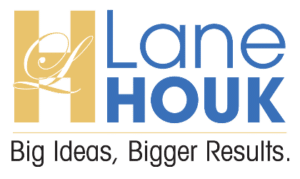If you’re an agency owner, you’ve probably heard of the term “Google E-E-A-T (fka E-A-T).” But what does it mean? Why is it important for your website and your client websites? In this article, we’ll explore the concepts of Google E-E-A-T. We’ll also dive into how Google uses E-E-A-T as a ranking factor and in its quality rater guidelines. Finally, we’ll discuss how you can improve your website’s E-E-A-T to boost visibility in search results.
What is Google E-E-A-T?
First, let’s define each of the components of Google E-E-A-T:
- Experience: This is the new element or component added to E-A-T. See more info below.
- Expertise: This refers to the level of knowledge and expertise that a content creator or website has on a particular topic.
- Authoritativeness: This refers to how much authority a content creator or website has on a particular topic.
- Trustworthiness: This refers to the level of trust that a content creator or website has built with its audience.
- Page Quality: This refers to the overall quality of a webpage, including factors such as the credibility of the sources used, the formatting and organization of the content, and the user experience.
In short, to better assess the results of search, Google announced the addition of E: Experience to Google E.A.T.
Here’s what the recent update from Google said directly, “Does content also demonstrate that it was produced with some degree of experience, such as with actual use of a product, having actually visited a place or communicating what a person experienced? There are some situations where really what you value most is content produced by someone who has first-hand, life experience on the topic at hand.”
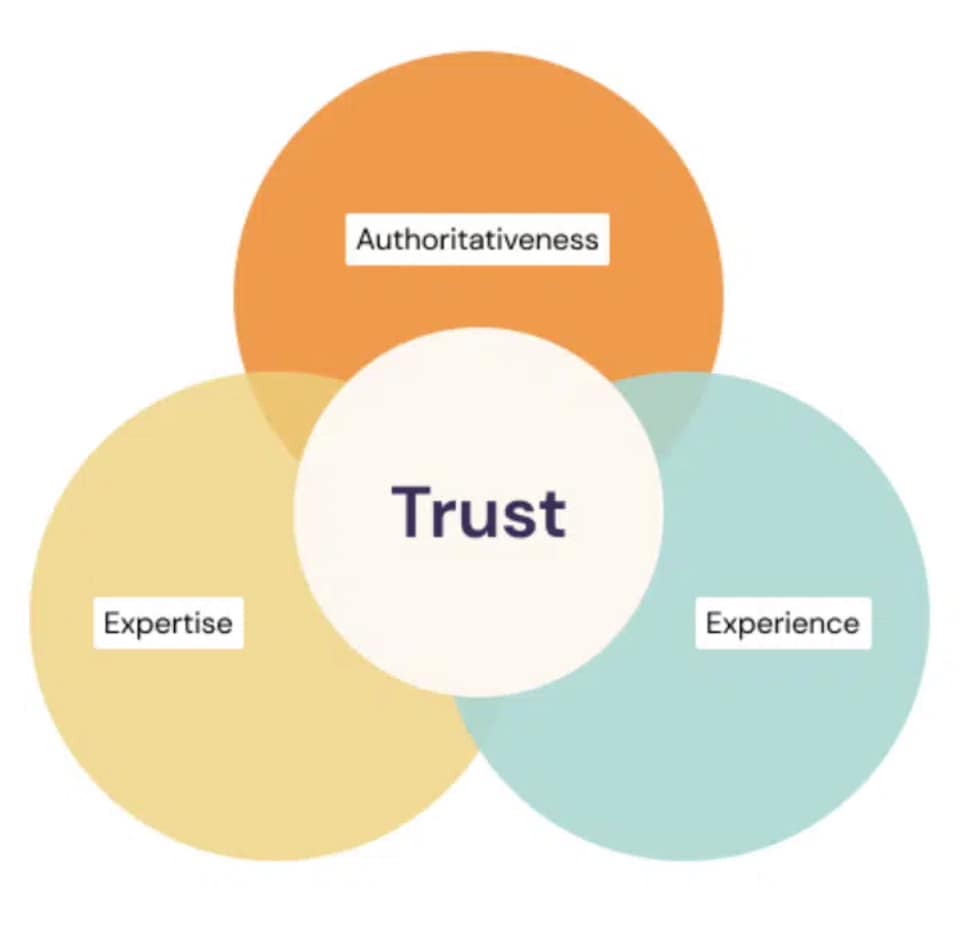
Content creators and authors need to reassess their SEO strategy in one way or another with these latest updates. Fail to get on the train [that has left the station already], watch the rankings tumble… Many local businesses are starting to watch their rankings fall already as the helpful content system has been rolling out since late August. Thin sites have been hit, most with lots of duplicate content spread throughout the site, and content tied to no individual in any meaningful ways that I have seen from basic inspections of most sites that were affected. Honestly, the rank and rent industry is prolific and some R&R sites look better than some real local business sites too. Everyone better pay heed here in my opinion. I have been teaching about Google E-A-T for over 4 years now. We have been implementing authorship into our higher-end campaigns for over a year. It just takes more work and a strategy. If you have questions, I will give you some good answers below. Read on and I also drop our last Masterclass replay from our YoutTube channel as well!
Here is the dictionary definition for “experience:”
1a: direct observation of or participation in events as a basis of knowledge;
b: the fact or state of having been affected by or gained knowledge through direct observation or participation
2a: practical knowledge, skill, or practice derived from direct observation of or participation in events or in a particular activity;
b: the length of such participation has 10 years experience in the job
3: something personally encountered, undergone, or lived through
4a: the conscious events that make up an individual life;
b: the events that make up the conscious past of a community or nation or humankind generally
5: the act or process of directly perceiving events or reality
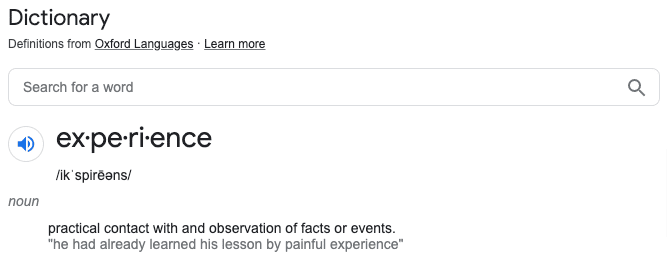
E-E-A-T and major updates to Google’s quality rater guidelines
The search engineers over at Google have been busy earning their keep for sure. The pace of technology and algorithm update(s) has been furious as of late. Founders Sergey Brin and Larry Page must be proud of the advanced search engine they created. We are entering a brave new world of AI, short for artificial intelligence. The algorithms running at Google are using incredibly advanced AI and yet many of the recent changes reflected in the updates are, in fact, aimed at combating the use of AI and software in the “art” or “science” of SEO, short for search engine optimization. The new quality raters guide is about 10 pages longer and has some significant changes to EAT by adding the extra E for Experience to E-E-AT. This is the second time this year that Google has changed or updated its QRG or search quality raters guidelines focusing again on authority, experience, and expertise and the nexus these 3 have to TRUST, the focal point in the “family of EEAT.” Google already confirmed prior that EAT plays a role in every search query and has SEO ranking factors in several different search systems.
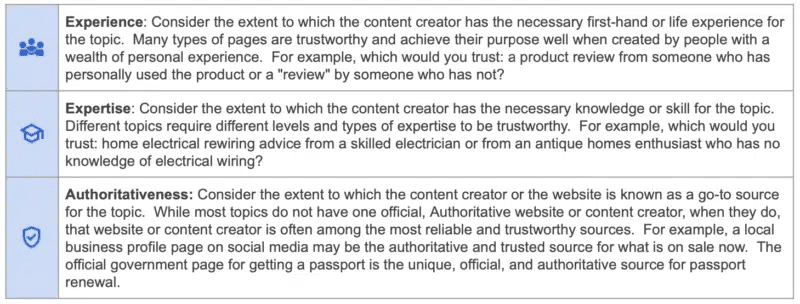
Double E-E-A-T Plays a Central Role in the Updated QRG
Double-E-E-A-T as someone at Google coined it. Yes, Google has added a letter to E-A-T, adding an extra E and going with E-E-A-T. What is the experience of the main content creator of the page being evaluated? What are their credentials and qualifications? Does the content demonstrate experience and expertise around the topic?
Google continued by saying, “You’ll also see clearer guidance throughout the guidelines underscoring the importance of content created to be original and helpful for people, and explaining that helpful information can come in a variety of different formats and from a range of sources.” Of course, YMYL categories will fall in tow with these upgrades to the QRG for the quality raters, without any doubts. The most important change to the QRG is the introduction of the letter E to the start of the popular acronym E-A-T.
Digging into the Search Quality Evaluator Guidelines
At the core of a search quality evaluation for the quality raters lies the word trust or trustworthiness. Ultimately, that is the role of a search equality evaluator. “Search results should provide authoritative and trustworthy information, not lead people astray with misleading content.” [source: Google]
QRG Section 2.3 Your Money or Your Life (YMYL) Topics
Conspicuously present again and quite important overall to understand are the guidelines around YMYL, which stands for Your Money, Your Life. Topics that “could significantly impact the health, financial stability, or safety of people, or the welfare or well-being of society” are classified as YMYL topics or business categories. Any business that falls into a YMYL category will receive more scrutiny in Google’s ecosystems. A search rater is literally tasked with assessing the potential amount of “harm” that a page of content might cause [customers] if left unchecked.
Here’s what Google has at the end of section 2.3 on YMYL:
Important: For pages about clear YMYL topics, we have very high Page Quality rating standards because low-quality pages on such topics could potentially negatively impact a person’s health, financial stability, safety, or the welfare or well-being of society.
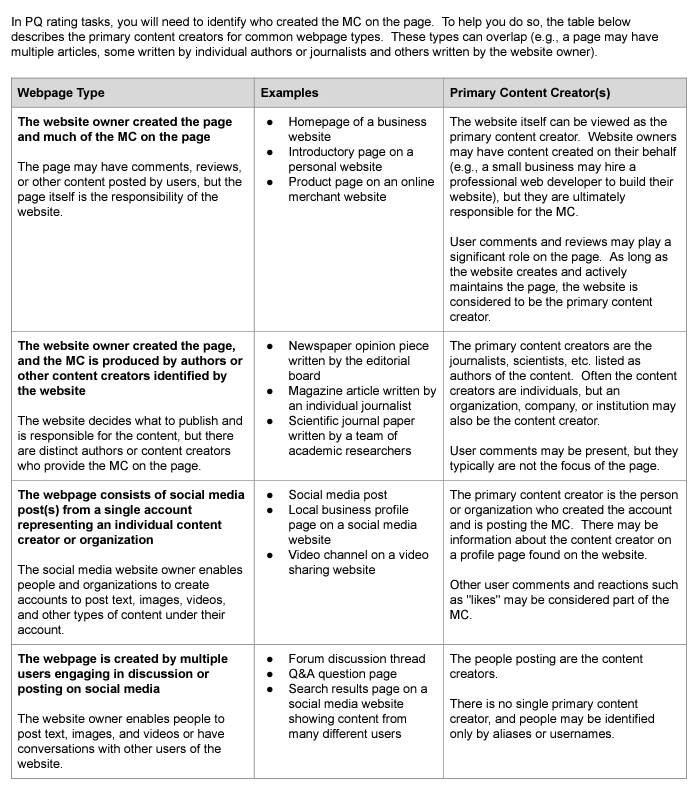
Finding Who is Responsible for the Website and Who Created the Content on the Page – Section 2.5.2
This is a huge section of the QRG in terms of impact in my opinion. “Every page belongs to a website and it should be clear who is responsible for the website and who created the content on the page you are evaluating.” If you aren’t highlighting the “who” behind any piece of content on your website, the question is why? From a numbers standpoint, the investment is well worth in for any business with a lifetime customer value over $1000.00. Many industries are way more than this; almost all professionals need to implement this into their website strategy.
When evaluating page quality (PQ) features, evaluators are tasked with identifying who created the main content of the page they are evaluating. If that’s not clear, you have an issue with quality because content that cannot be tied to a person is suspect for E-E-A, in which case, trustworthiness is also a question.
If you are a content creator or author, as a best practice, these elements of a page should be included in every page of content you publish:
- A clear purpose for the page; a page topic that drives the content focus. Should be optimized for desktop and mobile for iOS and Android operating system users.
- Information about you, the author.
- Quality using EEAT as a framework and combining that with effort, originality, and a demonstration of talent or skill on the chosen topic.
- A descriptive title. Great for advertising your products, services or solutions when it’s in your meta!
- Reader/user/customer reviews. See below for an example of how you can collect one review and compile it into a collage of reviews or testimonials and use them to promote your expertise and experience. Nothing speaks to someone’s level of expertise better than people in direct contact with that person. What they say can have a significant impact on an entity’s overall level of trust.
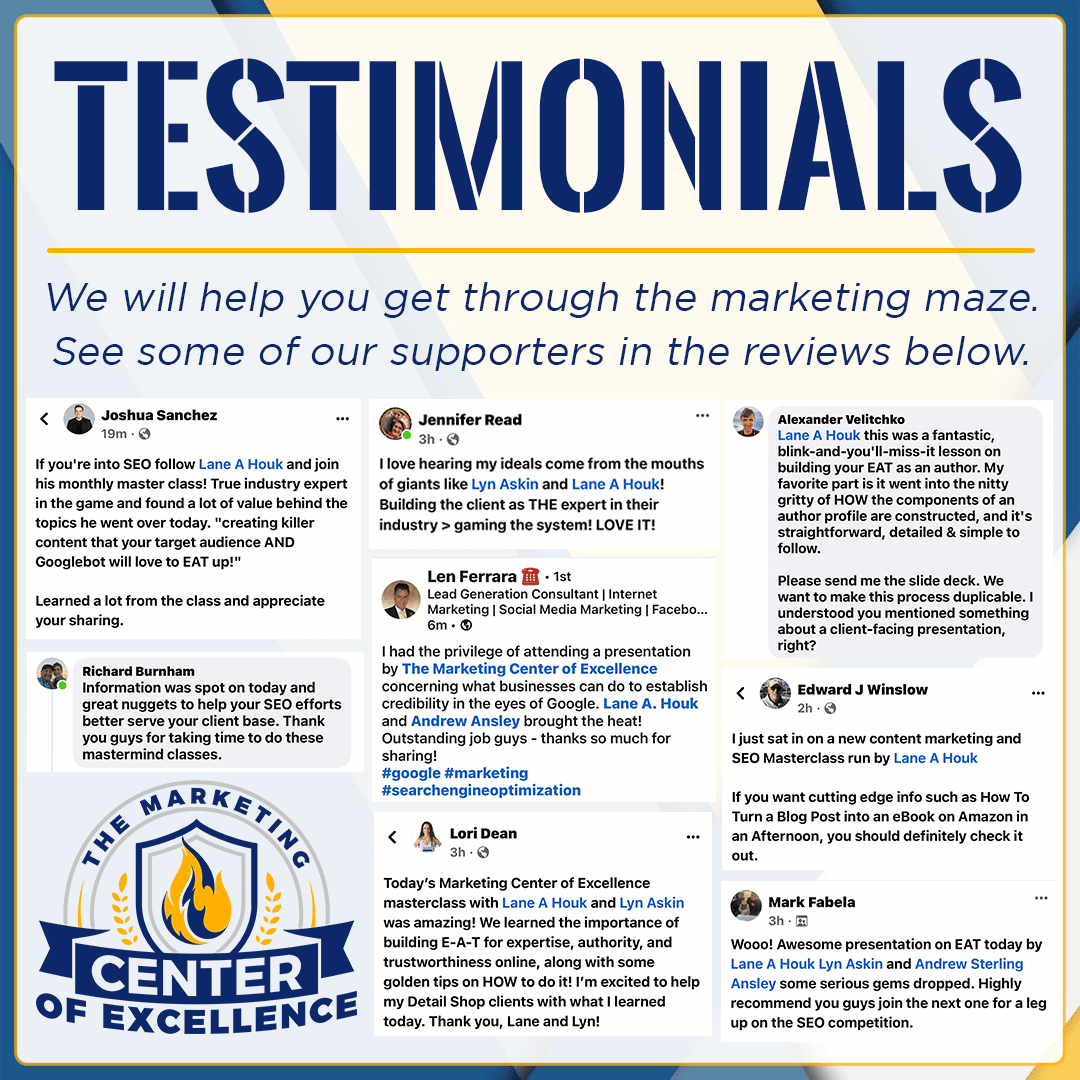
Evaluating the Reputation of a Website and Content Creator – Sections 3.3.x
It would be easy to pass right through this section of the QRG or quickly scan and move on but there are some huge hints that are revealed here in this section. The purpose of this section is to help the search evaluator look for reputation information about a website.
The QRG specifically instructs the evaluator to, “Look for articles, references, recommendations by experts, and other credible information written by people about the website. High-quality news articles and informational articles may be good sources of reputation information. Search for such articles. For example, try [ibm site:en.wikipedia.org]. News articles and informational articles can help you learn about a company and may include information specific to reputation, such as awards and other forms of recognition, or also controversies and issues.”
This is highly instructive if you are a marketer, marketing consultant, agency owner, or business owner. How many news articles about your company are you publishing? How many press releases are you publishing advertising announcements of awards, community events, new hires, and new announcements monthly? Quarterly? Annually? How about releasing educational and informational articles as a press release or in sponsored advertising to drive traffic?
These news articles will rank for your brand names and search evaluators are specifically instructed to run site operator searches as well so be sure your press releases are anchored to your domain, not a “news wire” domain or newsroom.
Also consider building a Wiki around your company name, author name, and/or product name. Get others to add to it. Offer to write and publish a guest post on other sites and I would always recommend writing and publishing an eBook. With an eBook you have so many marketing and advertising uses plus so many platforms you can publish to that will extend your subject matter expertise into the published author realm.
For individual authors, focus on authorship profiles with complete biographical information and links to other profiles and publications you have content published on. Employment history in your LinkedIn profile is a huge indicator of experience; don’t overlook the importance of a fully completed LinkedIn profile. Your LinkedIn profile will almost certain
Experience, Expertise, Authoritativeness, and Trust (E-E-A-T) – Section 3.4
From the QRG: “The most important member at the center of the E-E-A-T family is Trust.”
Google essentially defines trust as: accurate, safe, honest and reliable. EEA or experience, expertise, and authoritativeness are familial concepts that support trust.
Here’s what Google has to say about Trust: Trust is the most important member of the E-E-A-T family because untrustworthy pages have low E-E-A-T no matter how Experienced, Expert, or Authoritative they may seem. For example, a financial scam is untrustworthy, even if the content creator is a highly experienced and expert scammer who is considered the go-to for running scams!
Your content must demonstrate first-hand experience with the topic or subject matter of the page. Google goes on to further explain what content that lacks E-E-A-T might look like in section 5.1 of the QRG.
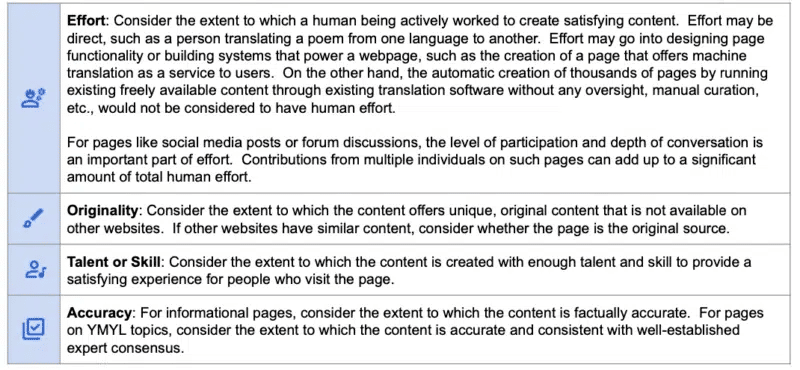
Lacking E-E-A-T – Section 5.1
Google provides examples of what it looks like to fail to demonstrate an adequate level of E-E-A-T for the topic or purpose of the page. These are the examples provided (page 51) in their QRG:
- “The content creator lacks adequate experience, e.g. a restaurant review written by someone who has never eaten at the restaurant
- The content creator lacks adequate expertise, e.g. an article about how to skydive written by someone with no expertise in the subject
- The website or content creator is not an authoritative or trustworthy source for the topic of the page, e.g. tax form downloads provided on a cooking website.
- The page or website is not trustworthy for its purpose, e.g. a shopping page with minimal customer service information”
These examples help conceptualize the distinct roles that each letter in E-E-A-T plays in evaluating page quality.
What does all of this mean? How can I apply E-E-A-T for my clients?
Ok so let’s make some sense of all this EEAT stuff in some practical applications. If you’re an agency owner or a C-level marketing executive, this is important and you need to build some or all of the following into your strategy, processes, and fulfillment for any business or individual that is paying you for search engine optimization (SEO).
8 Strategies for Demonstrating E-E-A-T Online
- Start with an absolute commitment to delivering/publishing quality content. The days of shortcuts in this arena are virtually over. If you’re building a real company, a real brand – or you’re the agency hired to help the entity accomplish this – you need to deliver on quality. At Quantum Agency, the white label agency I lead, I hired a full-time Quality Control Manager whose sole role is to oversee work product coming from our different teams in SEO/Digital Marketing, PPC, Web Design and Development, Creative Design, and the Content writers. This is not an easy task to complete at scale so agencies have a harder time than one company or individual who wants to do this for themselves. Quality content that demonstrates a level of experience, expertise, and authority or mastery on a topic will definitely win the day so make this the goal. This will likely involve training writers and equipping them with the knowledge, skills, and tools to level up their game in writing content at a higher level.
- Build out at least one author profile for the entity. Make sure the brand name of the author is 100% unique before building their profiles out on the platforms that make sense. I will provide some recommendations but choosing a unique brand name for the author is imperative for online differentiation.
- Use spell check and a tool like Grammarly (I like the Chrome extension) to ensure you get the spelling and punctuation right. This may sound obvious and it is but it still needs to be underscored. It’s hard to demonstrate expertise and authority over a topic if your content is riddled with small errors in these fundamental areas of authorship. For us, we have a Quality Control manager in place to ensure that nothing is sent to a client that doesn’t meet these expectations. However you decide to handle this component, it needs to be in your writing and QC SOPs, and make sure those are documented!
- Use a well-completed LinkedIn profile as a hub for your authorship profile. It has more functionality for listing experience and it also allows for your connections on LinkedIn to provide recommendations which are powerful votes on your skills (think experience and expertise). This is one of the first places a quality rater will go if your name is traced to a page of content. I’m sure they use Google search too. Put some real time and effort into the LinkedIn profile and publish/syndicate your content to this channel as a top priority. Build connections and a relevant following in this channel if possible.
- Setup authorship properly using the following platforms:
- WordPress.com
- Gravatar.com
- LinkedIn.com
- Quora.com
- Medium.com
- Substack.com
- Blogger.com
- Tumblr.com
- Reddit.com
- Twitter.com
- Connect all of these profiles by linking them together wherever possible; preferably in your main author profile on the website and the LinkedIn profile. Just creating all of these and connecting them together is a form of powerful link building and it helps Googlebot connect the dots around an entity.
- Syndicate and distribute your content everywhere. Once you have quality, informative, people-first content written, it’s time to broadcast it, amplify it, and syndicate your authored content. There are tools and software that can help. I recommend a WordPress blog be the real hub of all content that is produced. Once published to the WP blog, use the RSS feed functionality that is built into WordPress by default and syndicate that RSS feed using an automation strategy. We use IFTTT to help us do this efficiently. Make sure you have proper attribution in your syndicated content to reinforce the originally authored content on your WP blog. Social channels are also a great place to syndicate to and they are also great sources of traffic to your authored content – a fantastic and strong ranking signal.
- Communicate with your target audience via press releases. This is how authorities communicate. It’s also how big companies like IBM communicate. I’m not saying get rid of your blog. In fact, write and publish more. Answer questions your target audience has. What I am saying is that you should be using press releases regularly (weekly to monthly) to get your authored content published on authoritative news and media sites. The referring domains, brand mentions, link signals, and perceived authority are all very tangible outcomes of using press releases and media pickups as key components of your content syndication and authorship strategy. Make sure though that the PR service you use allows you to source (and publish) the press release on your website FIRST and source the press release to that page where it was published in all media pickups as the original source. From an online perspective of things, the original author of the press release and the page where it is published first will get the SEO benefit and authorship credit (called the canonical). This is a critical piece or step for maximum benefit in building authority. You don’t want to build the authority of the news and media sites; rather, you want authorship credit to flow from those sites back to the original source. Almost all press release, news, and wire services get this wrong. Whether by design or by accident, getting this wrong while using press releases highly mutes the benefit to the entity that is the actual subject of the release.
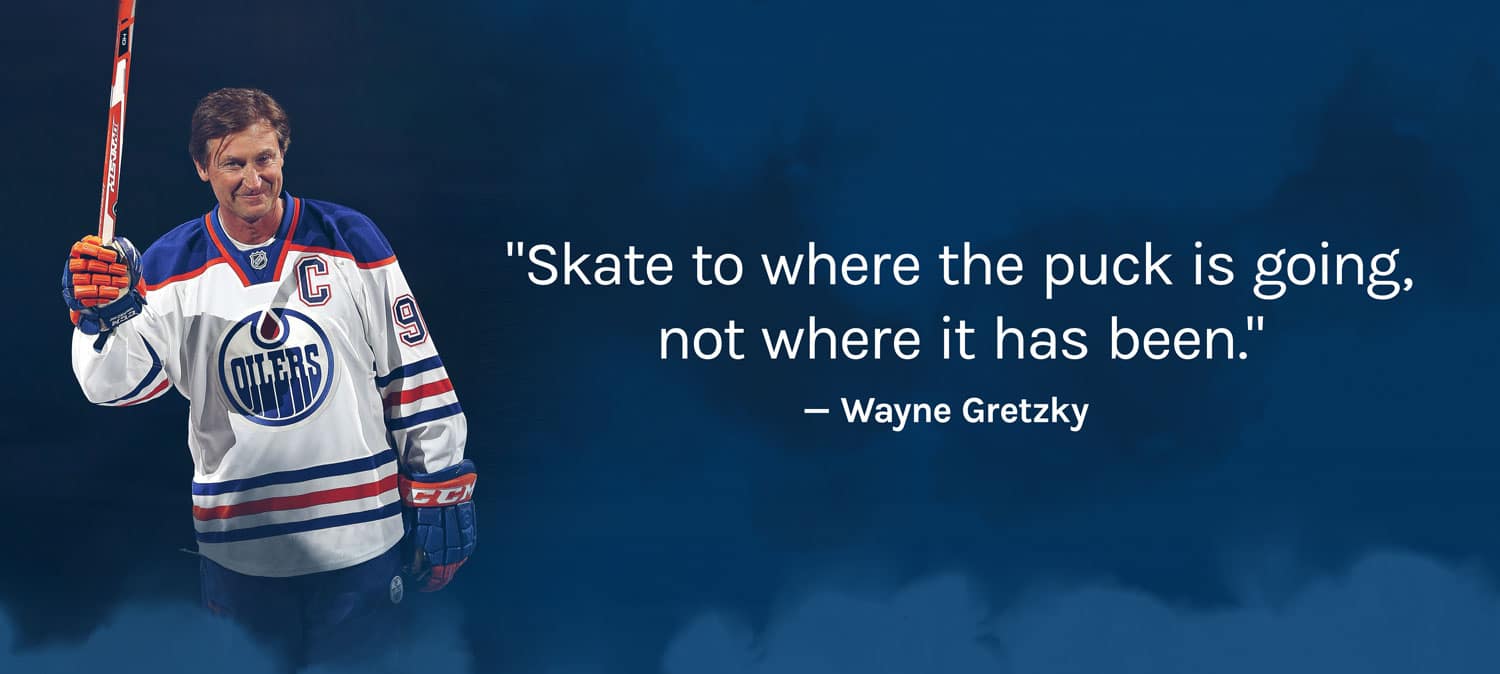
So where is Google (the puck) going with the Quality Rater Guidelines and E-E-A-T?
The Quality Rater Guidelines are a crucial document for anyone who works in search marketing because they give us deep insight into where Google wants its technology and algorithms to go, or better yet, where its algorithms already are in many respects as it pertains to the search system results we are already seeing. For me, reading the QRGs provides deep insights into what’s important.
For me, this is nothing new in terms of E-A-T. By adding Experience to the mix, this just makes sense from an operative standpoint in determining the quality of a page (of content) and ultimately, trust. It also makes sense to change the acronym from EAT to EEAT for better differentiation. It will certainly make aggregating a corpus of content and research around the topic and the hashtag #eeat or #EEAT. One thing is for certain, EEAT is here to stay and folks at Google are making it clear it’s part of every search query, and the results you see in the SERPS are most certainly driven, in part, by signals that demonstrate experience, expertise, authority, and trust.
Reading into and between the lines of the types of language in this document (the QRGs) can help inform and provide some valuable nuggets into what Google is looking for in terms of content quality, user experience, and E-E-A-T of websites. It provides great insight into what the focus the bot has in identifying data points around EEAT, along with what the search engines and the algorithm are trying to achieve. Certainly, it is highly instructive to understand what data points Google is or might be identifying and scraping to elicit these elements of EEAT which clearly affect search rankings and thus your website traffic.
Following these guidelines will help ensure your websites can achieve visibility on the internet in Google search, on all devices, and, ideally, not be negatively impacted by any of their algorithm updates or other penalties due to low-quality pages or pages that are deemed to be unhelpful to users due to underlying deficiencies in demonstrating experience, expertise, and authority, thus undermining the trust of the page, possibly the entire site.
What about AI content and SEO?
These are all really valid questions, and one’s that a lot of marketers and SEOs are asking right with the recent release of the ChatGPT tool a few weeks ago.
What does Google say about using AI content on web pages? Will it hurt my SEO?
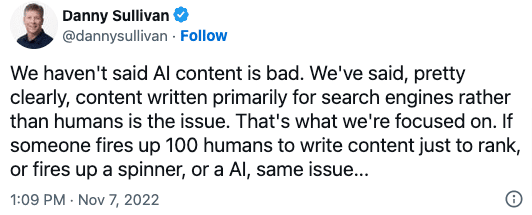
Barry Schwartz from SEO Roundtable had this to say: “Since the October Spam update and the helpful content update, many SEOs are saying AI-generated content is being targeted by Google. The answer, as I said previously, is not really. Danny Sullivan from Google said again, it is not about if a human or a machine wrote it but rather if the content is helpful. But in general, Danny said content by the people for the people is what makes the content generally helpful.”
One thing for sure I can say, from my own experience talking here… there is a huge difference in the “guided” vs “unguided” use of AI writing tools including ChatGPT. I have found that when a human is guiding the content strategy, research, content brief, and the final product and uses the ChatGPT tool for a guided, strategic output, the content is very helpful. This is my opinion but I find that the rudimentary use of these AI tools produces very poor-quality content. The ChatGPT tool has made some huge leaps in my opinion and guiding it along with good research and strategy, using tools like On-page.ai and InLinks.net, will produce a very high-quality article like this one.
Video Tutorial: Demonstrating E-E-A-T in your content | How I develop depth into my content using 3 tools
How did this article score on the EEAT levels?
Well, ok so there is no official EEAT score, first of all. Let me be clear. Second, I know of no current SEO software tool that directly measures EEAT signals for a given page or article [on a web page]. That said, I believe the best tool to help really develop an article into that “expert” level from a pure content and on-page SEO standpoint is On-Page.ai. My hat is off to Eric Lancheres who is the founder of this tool. I use it all the time and used it to frame out this article, then again to really dial it in contextually. As you can see from the image below, this article scored a perfect 100 when I was finally done. I started at zero quite literally.
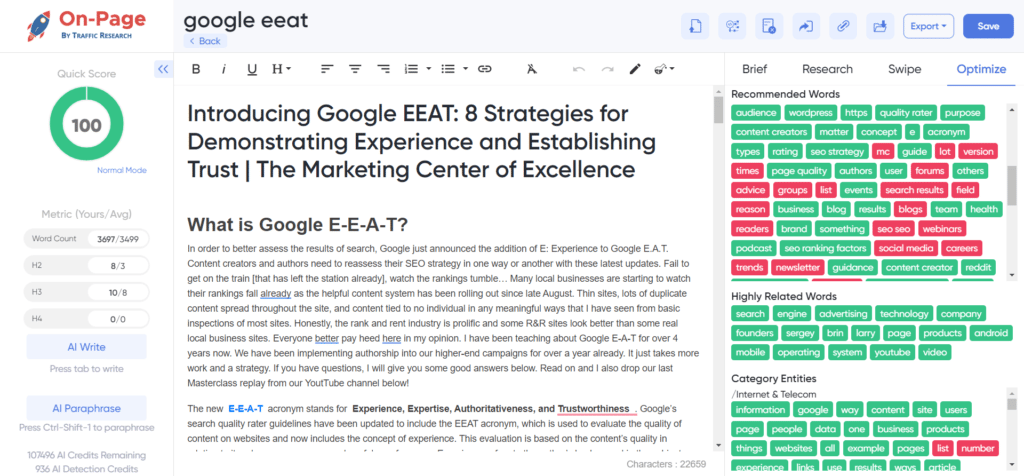
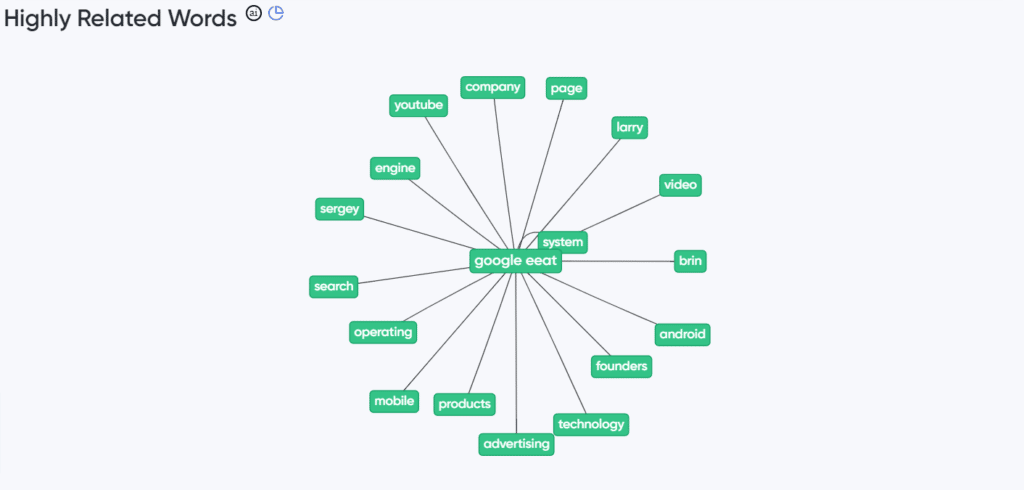
Below is this article’s relevance score as compared to the top 3 pages currently ranking for the search term: Google EEAT
As you can see, this article outscores all of the top 3. Does this mean that Google will automatically rank me in the top position(s)? Absolutely not. There is more to this game than just people-first content that demonstrates E.E.A.T. But this is a really good start and an article that the bot will find easy to reward. On-page.ai is a very good tool to help frame out the words, related words, category words, and entity-level words that should be inside your content if you want to demonstrate that you are an authority on this topic and then test your article against the competition. Now that the article is published, it’s time to syndicate, amplify and distribute!
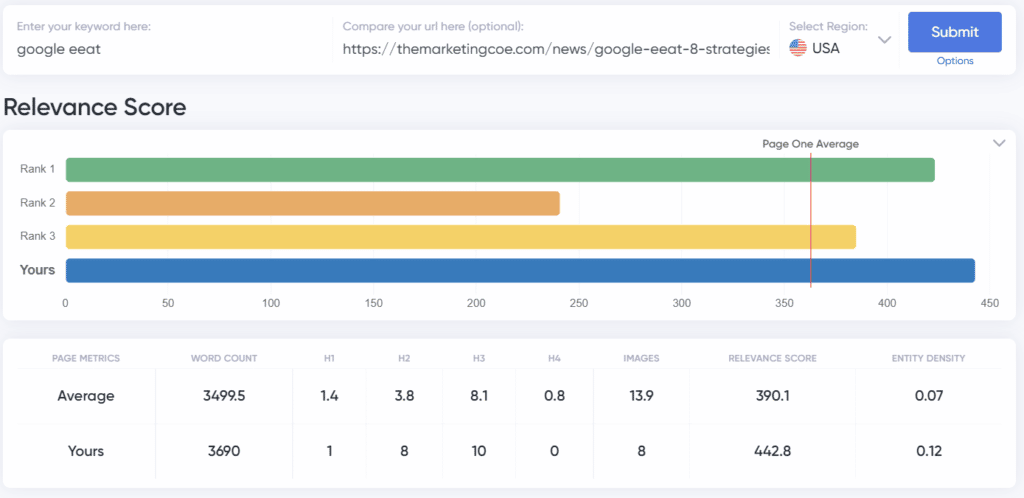
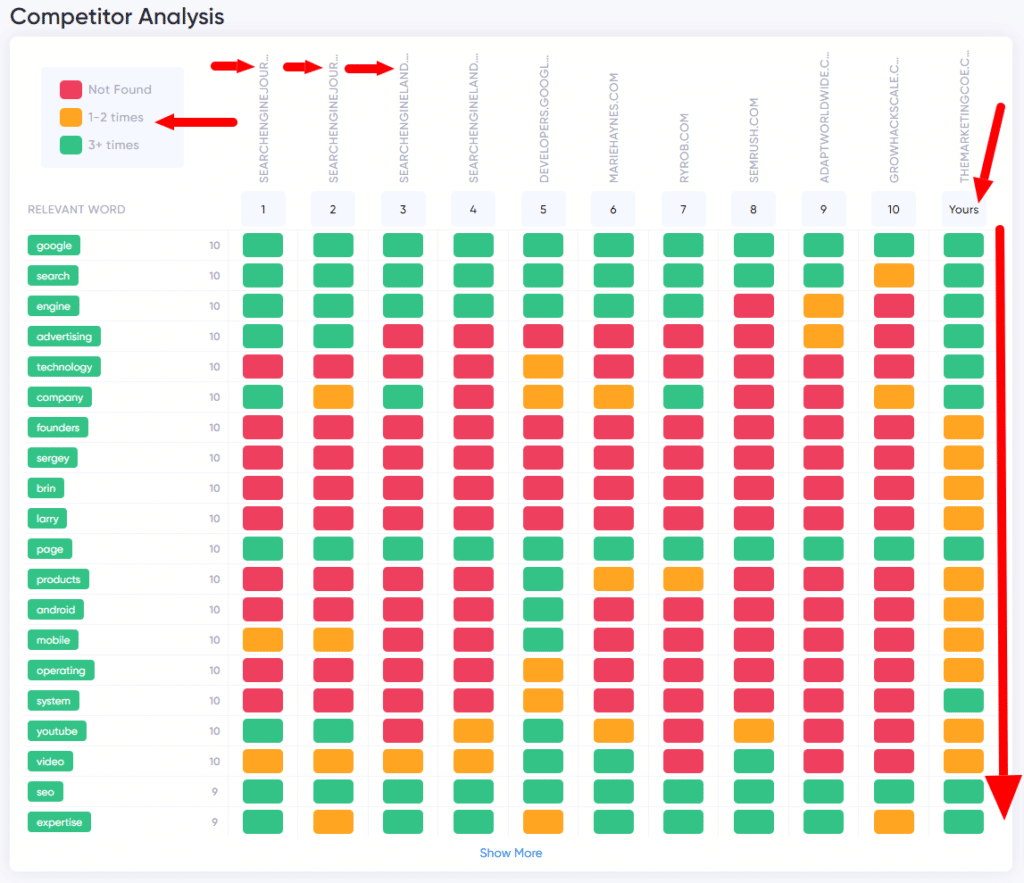
Video Tutorial: How I used the on-page.ai software to assist me in developing this article.
I hope you enjoy it!
So how did I do? Was this expert level? Does my experience qualify me to write about this topic with authority? If you have any feedback please leave a comment below!
Watch last month’s Masterclass on the Helpful Content Update, E-A-T and Authorship
To help really connect the dots from the concepts and strategies mentioned in this article, I am sharing a replay of the YouTube video from our last Masterclass. Enjoy!
About the Author

About The Marketing Center of Excellence
The Marketing Center of Excellence is a community of marketers and agency owners that collaborate and provide leadership, best practices, research, support, training, software, and digital technology to help community members drive performance and scale their agencies.
For more information about the marketing podcast, visit The Marketing Center of Excellence website at https://themarketingcoe.com. The team can be reached by email at [email protected]
You can also listen to our podcast on Spotify, Google Podcasts, Amazon Music, Apple Podcasts, Stitcher and Podcast.co.
REGISTER FOR THE MCOE MASTERCLASS SERIES
THE LAST TUESDAY OF EVERY MONTH AT 12 PM EASTERN:


